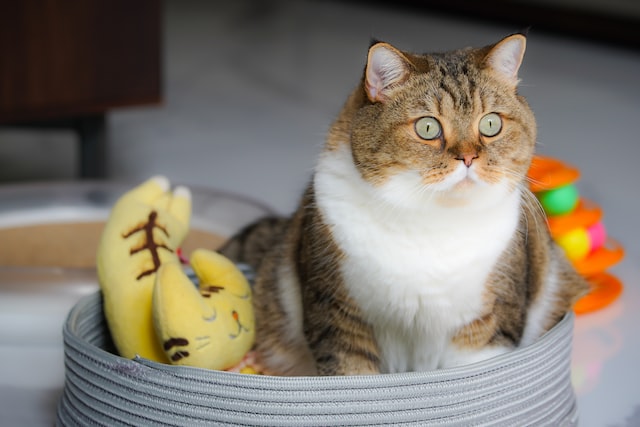
Cat diet is a very crucial factor as far as cat care is concerned. The cat is a true carnivore and in the wild catches and kills small rodents and birds and consumes the whole of its prey to fulfill its nutritional requirements. The prey animal consists mainly of protein with a smaller amount of fat and a considerable proportion (90 per cent) of fluid. By eating the whole of die animal, including the contents of the gut and the bones, the cat obtains sufficient quantities of vitamins and minerals such as calcium.
The most important nutritional requirements are therefore for protein and fat, and cats require proportionately greater amounts than is the case for dogs. Also, unlike dogs, cats are not able to use carbohydrates as an energy source to any significant extent. In fact, carbohydrates, contained in such foods as cereals, bread and potatoes, are not needed at all in the diet of the cat but can be given in small amounts in a form that has been cooked. The reason for this are that cats are unable to digest starch unless it is in cooked cat food.
Vitamins and Minerals For Cat
The best food to offer is one with a high protein content, which is essential for growth and repair of tissues and is also used to provide energy. There should also be some fat present as this is a more readily converted source of energy than protein. The main vitamins required by cats are A, D and B. They are able to manufacture vitamin C within the body and apparently do not need vitamin K. Cats are not able to change the precursors of vitamin A (called carotenoids and found in vegetables such as carrots as well as other plants) into the vitamin. They must therefore obtain vitamin A directly from food, and good sources are liver, oily fish and cod liver oil. However, since vitamin A is fat-soluble, i.e., it can be stored and concentrated in the body, it is needed only sparingly and in small quantities. Indeed, it is important to avoid giving an excess of all the fat-soluble vitamins, A, D and E, as this can lead to disorders and deformities of the skeleton and organs (hypervitaminosis). In general, an adult cat is unlikely to be deficient in any vitamins if it is being fed a balanced and varied diet, and there is no need to add manufactured supplements.
The most important minerals needed are calcium and phosphorus, which are usually present in sufficient quantities in a good diet. An excess of minerals can cause painful disorders of the skeleton and joints, particularly in growing kittens; hence supplements should not normally be given.
There are circumstances when supplements of minerals and vitamins may be prescribed for a cat by a veterinary surgeon. Cats that have been ill and are reluctant to eat, or those that are debilitated for some reason, growing kittens and pregnant females may occasionally require such supplements in their diet. It is essential that this need is determined by a veterinary surgeon. The cat’s owner should not give vitamin or mineral supplements without obtaining expert advice.
Many people in Great Britain now eat a vegetarian diet. Those who are dog and cat owners sometimes ask if such a diet is a suitable one for their pet. The answer for this is that while a dog can be satisfactorily nourished on a vegetarian diet because it is more omnivorous, a cat is a true carnivore and needs protein and fat derived from animal sources or else it will become ill. These differences do not relate to the food that the animals can be persuaded to eat but to internal metabolic processes within cells and tissues.
It has already been stated that cats must obtain vitamin A from animal sources. In contrast to dogs, they are not able to convert the precursors of the vitamin, called carotenoids, into vitamin A. Both dogs and cats have a dietary need for ten essential amino acids (the units of which proteins are composed), and these can be found in both animal and plant foods. There is, however, another vital amino acid, called taurine, that many mammals, including dogs, are able to produce within the body from the other amino acids consumed in food. The cat does not have this ability and must obtain taurine from animal protein where it is present in higher quantities. (A deficiency in this amino acid leads to degeneration of the light-receiving layer of the eye called the retina and subsequent blindness.)
Fats from both plant and animal sources are a source of energy and contain essential fatty acids that are necessary for many internal biochemical reactions vital for life. Of particular importance in the diet of both dogs and cats is linoleic acid, which is one of three essential fatty acids. Linoleic acid is found in animal fats and vegetable oils such as corn oil. However, dogs are able to manufacture the other two essential fatty acids, which are arachidonic and linolenic acid, within the body. Dietary linoleic acid is converted into the other two essential fatty acids when needed, and dogs can obtain this from either plant or animal sources. Cats, on the other hand, are unable to convert linoleic acid and must obtain linolenic acid and arachidonic acid in their food. These are only found in the tissues of animals. It can be seen, therefore, that while cats may enjoy eating other types of food, they lack the necessary internal adaptations to be anything other than carnivores and become ill if they are given an unsuitable diet.